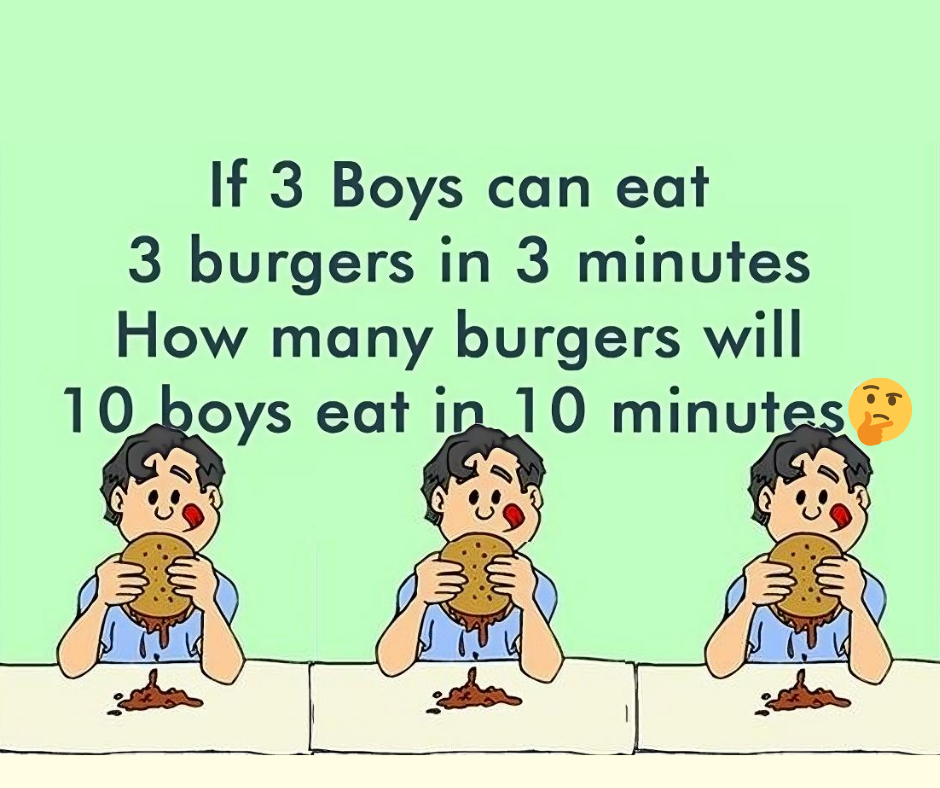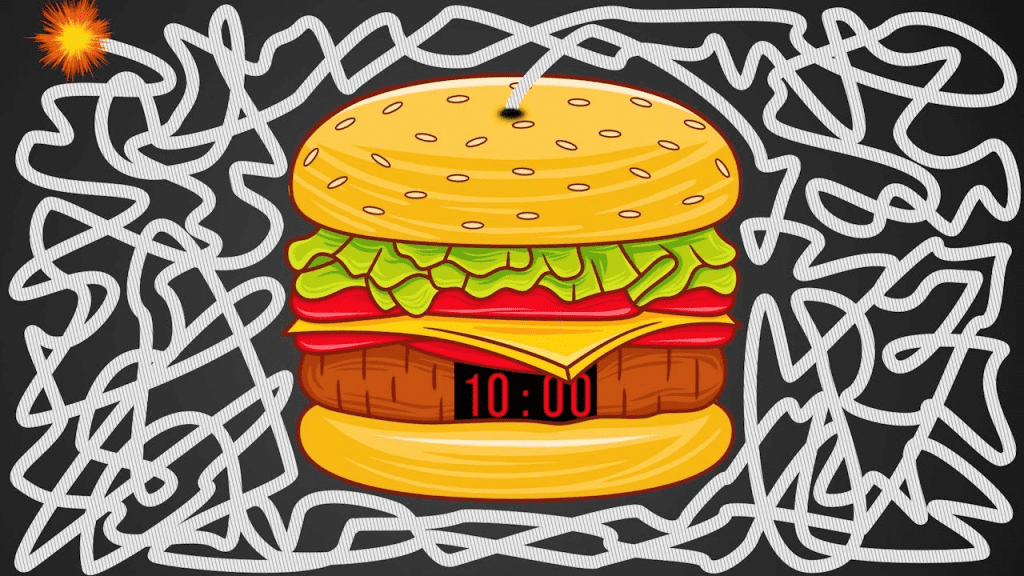Who doesn’t love a good brain teaser? They’re fun, challenging, and a fantastic way to keep your mind sharp. Today, we’re diving into a puzzle that might seem straightforward but has a tricky twist that could easily lead you astray. Ready to test your logic skills and see if you can crack it?
The Challenge
Here’s the question:

If 3 boys can eat 3 burgers in 3 minutes, how many burgers can 10 boys eat in 10 minutes?
Sounds simple, right? But as with most brain teasers, the answer might not be as obvious as it seems. Many people make common mistakes with questions like these by jumping to conclusions. Before you leap to an answer, let’s break down this riddle step-by-step and explore the potential pitfalls.
Common Mistakes People Make
With puzzles like this, it’s easy to get tripped up. Here are a few common errors people tend to make:
1. Assuming Linear Proportions
A common approach is to assume that if 3 boys can eat 3 burgers in 3 minutes, then 10 boys would eat 10 burgers in the same amount of time. While this may seem logical, it overlooks the role of time in the equation and may lead to a simple yet incorrect answer.
2. Overthinking the Math
Some people tend to complicate the puzzle by diving into complex calculations. But the beauty of this question lies in its simplicity. Overcomplicating it with unnecessary math will likely lead to a wrong answer. Remember, a logical approach is often the best way to go.
3. Ignoring the Role of Time
It’s easy to get sidetracked by the numbers and overlook the time element. Since the question includes a specific number of boys and a specific duration, you need to consider both factors. Ignoring the time aspect can lead to an answer that’s incomplete or misleading.
Breaking Down the Solution
To tackle this puzzle, let’s break it down systematically and arrive at the correct answer.
Step 1: Understand the Rate
Let’s start by analyzing the information given. We know that:
- 3 boys can eat 3 burgers in 3 minutes.
From this, we can deduce that 3 boys collectively eat 1 burger per minute. Therefore, each boy eats at a rate of 1 burger every 3 minutes. This gives us a foundational rate of consumption to work with.
Step 2: Calculate the Rate for One Boy
If 3 boys eat 3 burgers in 3 minutes, then each boy eats 1 burger in 3 minutes. This means each boy’s individual rate is:
- 1 burger / 3 minutes.
Step 3: Scale Up to 10 Boys
Now that we know each boy eats 1 burger in 3 minutes, let’s figure out how many burgers 10 boys can eat in 10 minutes. Since each boy can eat 1 burger every 3 minutes, in a 10-minute span, each boy could eat:
- 10 minutes / 3 minutes per burger ≈ 3.33 burgers.
But rather than dealing with decimals, let’s calculate the total consumption rate for all 10 boys over the 10-minute period.
Step 4: Calculate the Total Burgers for 10 Boys in 10 Minutes
If each boy eats 1 burger every 3 minutes, then in a total of 10 minutes, one boy could eat:
10 minutes divided by 3 burgers equals 3.33 burgers
So, for 10 boys in 10 minutes:
- 10 boys × 3.33 burgers ≈ 33 burgers.
However, a simpler way to approach this is to realize that if 3 boys can eat 3 burgers in 3 minutes, then with an equal rate, 10 boys can eat 10 burgers in 10 minutes. Therefore, the answer is 10 burgers.
Understanding the Logic Behind the Answer

To ensure we’ve tackled this correctly, let’s double-check: we established that 3 boys eat 3 burgers in 3 minutes, which means each boy’s eating rate is consistent. So, scaling up to 10 boys over 10 minutes simply scales up the initial rate proportionally:
- Burgers eaten = Boys×Minutes÷Rate of Time
In this case:
- 10 burgers is the accurate answer.
What This Puzzle Teaches Us About Problem-Solving
This brain teaser may look simple, but it challenges you to think about both rate and time. Many real-world problems require this same type of analysis—balancing multiple factors to reach a logical conclusion. With puzzles like these, you can hone your ability to consider all relevant variables, paying attention to both detail and big-picture elements.
Did you enjoy solving this puzzle? If so, you’re on the right track to developing a sharper problem-solving mindset! Logic puzzles are a fun way to train your brain to approach challenges with a fresh perspective, helping you spot hidden patterns and think outside the box.
Share Your Answer and Keep the Fun Going!
Now that you’ve worked through this puzzle, share your answer and approach with others. Compare strategies, see if they came to the same solution, and talk about any mistakes made along the way. By sharing with friends and family, you can enjoy a new perspective on this tricky challenge. Brain teasers are a great way to boost your cognitive skills, engage in some friendly competition, and, most importantly, have fun while you’re at it.
Did you find this puzzle to be more challenging than you expected? Then you’re not alone. But as you continue tackling brain teasers, you’ll build both confidence and critical thinking skills. So, take a moment to celebrate your success and look forward to the next challenge. After all, puzzles like these remind us that even when the solution isn’t immediately obvious, a little logic and patience go a long way.


